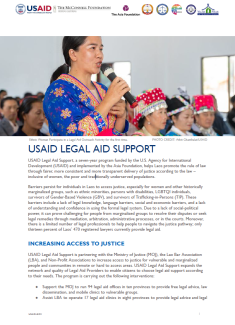USAID Legal Aid Support, a seven-year program funded by the U.S. Agency for International Development (USAID) and implemented by the Asia Foundation, helps Laos promote the rule of law through fairer, more consistent and more transparent delivery of justice according to the law – inclusive of women, the poor and traditionally underserved populations.
Barriers persist for individuals in Laos to access justice, especially for women and other historically marginalized groups, such as ethnic minorities, persons with disabilities, LGBTQI individuals, survivors of Gender-Based Violence (GBV), and survivors of Trafficking-in-Persons (TIP). These barriers include a lack of legal knowledge, language barriers, social and economic barriers, and a lack of understanding and confidence in using the formal legal system. Due to a lack of social-political power, it can prove challenging for people from marginalized groups to resolve their disputes or seek legal remedies through mediation, arbitration, administrative processes, or in the courts. Moreover, there is a limited number of legal professionals to help people to navigate the justice pathway; only thirteen percent of Laos’ 470 registered lawyers currently provide legal aid.
INCREASING ACCESS TO JUSTICE
USAID Legal Aid Support is partnering with the Ministry of Justice (MOJ), the Lao Bar Association (LBA), and Non-Profit Associations to increase access to justice for vulnerable and marginalized people and communities in remote or hard to access areas. USAID Legal Aid Support expands the network and quality of Legal Aid Providers to enable citizens to choose legal aid support according to their needs. The program is carrying out the following interventions:
- Support the MOJ to run 94 legal aid offices in ten provinces to provide free legal advice, law dissemination, and mobile clinics to vulnerable groups.
- Assist LBA to operate 17 legal aid clinics in eight provinces to provide legal advice and legal representation to vulnerable groups.
- Partner with the Association for Development of Women and Legal Education (ADWLE) to provide legal aid to survivors of GBV.
- Partner with Bridges Across Borders Southeast Asia Community Legal Education (BABSEACLE) to enhance access to justice through clinical legal education in collaboration with law students.
- Partnering with Village Focus International (VFI) and Alliance Anti-Trafic (AAT) to train lawyers to identify TIP indicators and to support survivors of TIP.
KEY RESULTS
- USAID assisted MOJ and LBA to nearly triple the country’s number of legal aid offices across the country. This support has substantially increased the provision of free legal services in the form of advice, information provision, documentation, and representation to those most vulnerable to exploitation. More than 5,000 individuals received legal aid on land issues, inheritance disputes, family law matters, and GBV, thereby creating new pathways to justice for more people including vulnerable groups.
- Strengthened the capacity of nearly 2,500 legal aid providers (including government officials, lawyers, non-state legal aid providers, law students, and others) to increase the availability of quality, linguistically-accessible, and survivor-centered services to vulnerable individuals.
- USAID engaged over 1,300 law students at the National University of Laos and the University of Champasak in Clinical Legal Education. Students conducted community legal teachings, street law clinics with high school students, and villages, and received public seminars by legal professionals, including on the role of LBA. This helps law students understand the importance of basic legal concepts such as the right to a fair trial, the application of the rule of law and the transparent delivery of justice in Laos.
- Collaborated with MOJ to produce linguistically-accessible legal information materials such as ‘Know Your Rights’ brochures in Lao, Hmong, and Khmu languages and legal information videos including with sign language. These materials have been disseminated over 200,000 times to increase public legal awareness, particularly in remote areas.
- Partnered with the National Institute of Justice to provide 70 financial scholarships to qualify new justice practitioners, including lawyers to expand the number of lawyers to serve the justice needs of Lao citizens.
- Trained 18 interpreters of Hmong, Khmu, and sign language, and trained 22 social workers of the Laos Disabled Women’s Association to assist persons with disabilities and survivors of GBV to overcome communication barriers when seeking justice.
- Established the Women’s Justice Network to empower women judges, prosecutors, lawyers, and policymakers to assume leadership roles in order to promote a more inclusive justice sector that can better serve the needs of vulnerable groups.


